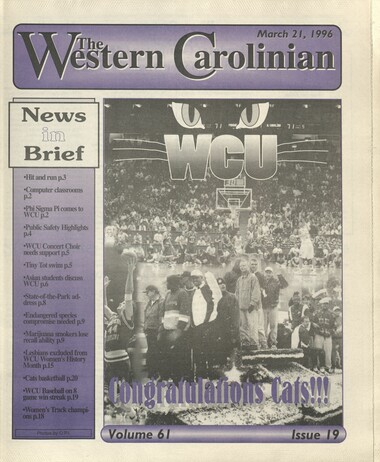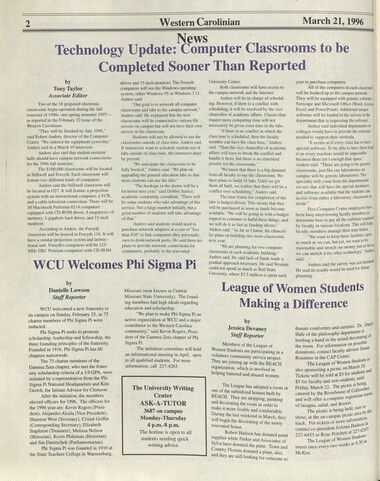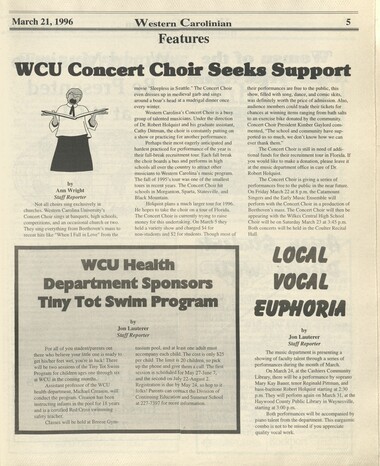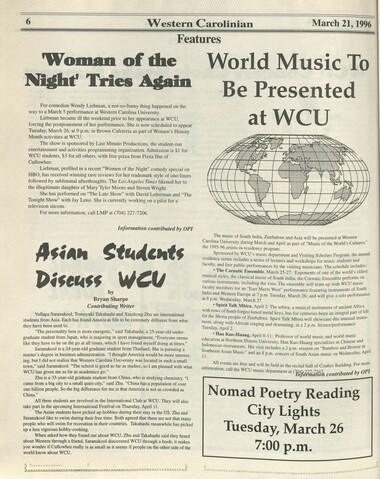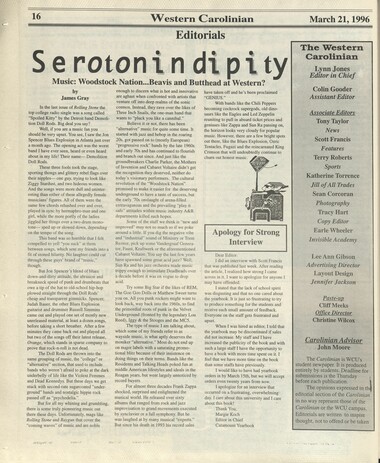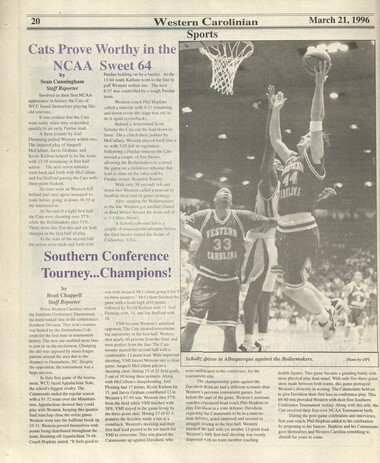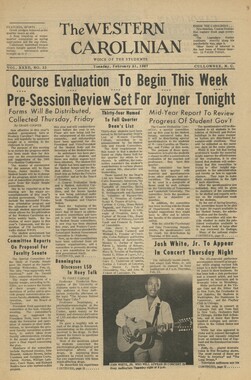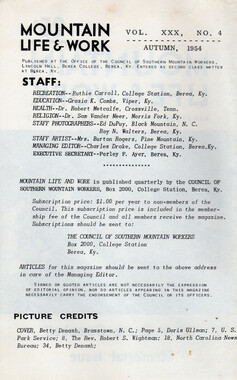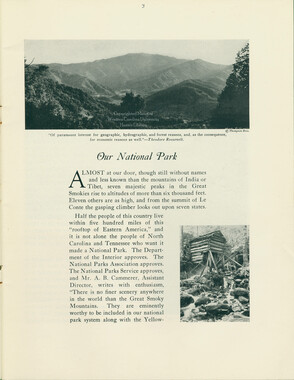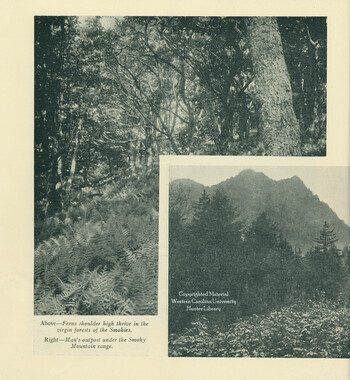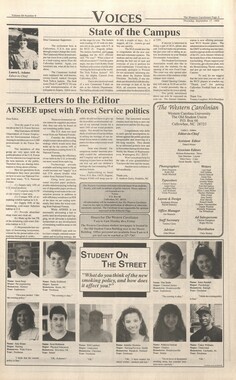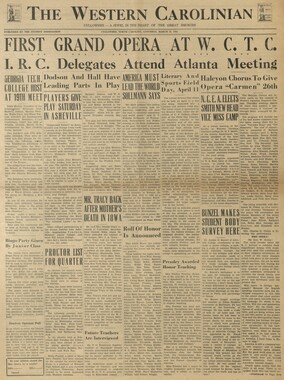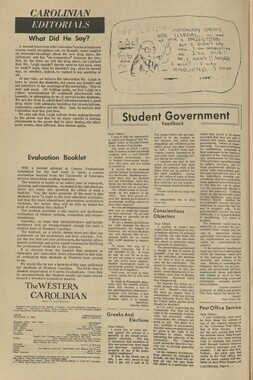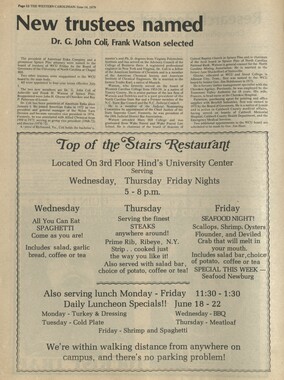Western Carolina University (20)
View all
- Canton Champion Fibre Company (2308)
- Cherokee Traditions (292)
- Civil War in Southern Appalachia (165)
- Craft Revival (1942)
- Great Smoky Mountains - A Park for America (2766)
- Highlights from Western Carolina University (430)
- Horace Kephart (941)
- Journeys Through Jackson (154)
- LGBTQIA+ Archive of Jackson County (85)
- Oral Histories of Western North Carolina (314)
- Picturing Appalachia (6772)
- Stories of Mountain Folk (413)
- Travel Western North Carolina (160)
- Western Carolina University Fine Art Museum Vitreograph Collection (129)
- Western Carolina University Herbarium (92)
- Western Carolina University: Making Memories (708)
- Western Carolina University Publications (2283)
- Western Carolina University Restricted Electronic Theses and Dissertations (146)
- Western North Carolina Regional Maps (71)
- World War II in Southern Appalachia (131)
University of North Carolina Asheville (6)
View all
- Allanstand Cottage Industries (62)
- Appalachian National Park Association (53)
- Bennett, Kelly, 1890-1974 (1388)
- Berry, Walter (76)
- Brasstown Carvers (40)
- Carver, George Washington, 1864?-1943 (26)
- Cathey, Joseph, 1803-1874 (1)
- Champion Fibre Company (233)
- Champion Paper and Fibre Company (297)
- Cherokee Indian Fair Association (16)
- Cherokee Language Program (22)
- Crowe, Amanda (40)
- Edmonston, Thomas Benton, 1842-1907 (7)
- Ensley, A. L. (Abraham Lincoln), 1865-1948 (275)
- Fromer, Irving Rhodes, 1913-1994 (70)
- George Butz (BFS 1907) (46)
- Goodrich, Frances Louisa (120)
- Grant, George Alexander, 1891-1964 (96)
- Heard, Marian Gladys (60)
- Kephart, Calvin, 1883-1969 (15)
- Kephart, Horace, 1862-1931 (313)
- Kephart, Laura, 1862-1954 (39)
- Laney, Gideon Thomas, 1889-1976 (439)
- Masa, George, 1881-1933 (61)
- McElhinney, William Julian, 1896-1953 (44)
- Niggli, Josephina, 1910-1983 (10)
- North Carolina Park Commission (105)
- Osborne, Kezia Stradley (9)
- Owens, Samuel Robert, 1918-1995 (11)
- Penland Weavers and Potters (36)
- Roberts, Vivienne (15)
- Roth, Albert, 1890-1974 (142)
- Schenck, Carl Alwin, 1868-1955 (1)
- Sherrill's Photography Studio (2565)
- Southern Highland Handicraft Guild (127)
- Southern Highlanders, Inc. (71)
- Stalcup, Jesse Bryson (46)
- Stearns, I. K. (213)
- Thompson, James Edward, 1880-1976 (226)
- United States. Indian Arts and Crafts Board (130)
- USFS (683)
- Vance, Zebulon Baird, 1830-1894 (1)
- Weaver, Zebulon, 1872-1948 (58)
- Western Carolina College (230)
- Western Carolina Teachers College (282)
- Western Carolina University (1794)
- Western Carolina University. Mountain Heritage Center (18)
- Whitman, Walt, 1819-1892 (10)
- Wilburn, Hiram Coleman, 1880-1967 (73)
- Williams, Isadora (3)
- Cain, Doreyl Ammons (0)
- Crittenden, Lorraine (0)
- Rhodes, Judy (0)
- Smith, Edward Clark (0)
- Appalachian Region, Southern (2569)
- Asheville (N.C.) (1923)
- Avery County (N.C.) (26)
- Blount County (Tenn.) (161)
- Buncombe County (N.C.) (1672)
- Cherokee County (N.C.) (283)
- Clay County (N.C.) (555)
- Graham County (N.C.) (233)
- Great Smoky Mountains National Park (N.C. and Tenn.) (519)
- Haywood County (N.C.) (3524)
- Henderson County (N.C.) (70)
- Jackson County (N.C.) (4694)
- Knox County (Tenn.) (25)
- Knoxville (Tenn.) (12)
- Lake Santeetlah (N.C.) (10)
- Macon County (N.C.) (420)
- Madison County (N.C.) (212)
- McDowell County (N.C.) (39)
- Mitchell County (N.C.) (132)
- Polk County (N.C.) (35)
- Qualla Boundary (981)
- Rutherford County (N.C.) (76)
- Swain County (N.C.) (2115)
- Transylvania County (N.C.) (270)
- Watauga County (N.C.) (12)
- Waynesville (N.C.) (84)
- Yancey County (N.C.) (72)
- Aerial Photographs (3)
- Aerial Views (60)
- Albums (books) (4)
- Articles (1)
- Artifacts (object Genre) (228)
- Bibliographies (1)
- Biography (general Genre) (2)
- Cards (information Artifacts) (38)
- Clippings (information Artifacts) (191)
- Crafts (art Genres) (622)
- Depictions (visual Works) (21)
- Design Drawings (1)
- Drawings (visual Works) (184)
- Envelopes (73)
- Facsimiles (reproductions) (1)
- Fiction (general Genre) (4)
- Financial Records (12)
- Fliers (printed Matter) (67)
- Glass Plate Negatives (381)
- Guidebooks (2)
- Internegatives (10)
- Interviews (815)
- Land Surveys (102)
- Letters (correspondence) (1013)
- Manuscripts (documents) (618)
- Maps (documents) (177)
- Memorandums (25)
- Minutes (administrative Records) (59)
- Negatives (photographs) (5835)
- Newsletters (1285)
- Newspapers (2)
- Occupation Currency (1)
- Paintings (visual Works) (1)
- Pen And Ink Drawings (1)
- Periodicals (193)
- Personal Narratives (10)
- Photographs (12976)
- Plans (maps) (1)
- Poetry (6)
- Portraits (4533)
- Postcards (329)
- Programs (documents) (151)
- Publications (documents) (2236)
- Questionnaires (65)
- Scrapbooks (282)
- Sheet Music (2)
- Slides (photographs) (402)
- Songs (musical Compositions) (2)
- Sound Recordings (796)
- Specimens (92)
- Speeches (documents) (15)
- Tintypes (photographs) (8)
- Transcripts (322)
- Video Recordings (physical Artifacts) (23)
- Vitreographs (129)
- Text Messages (0)
- A.L. Ensley Collection (275)
- Appalachian Industrial School Records (7)
- Appalachian National Park Association Records (336)
- Axley-Meroney Collection (2)
- Bayard Wootten Photograph Collection (20)
- Bethel Rural Community Organization Collection (7)
- Blumer Collection (5)
- C.W. Slagle Collection (20)
- Canton Area Historical Museum (2110)
- Carlos C. Campbell Collection (282)
- Cataloochee History Project (64)
- Cherokee Studies Collection (4)
- Daisy Dame Photograph Album (5)
- Daniel Boone VI Collection (1)
- Doris Ulmann Photograph Collection (112)
- Elizabeth H. Lasley Collection (1)
- Elizabeth Woolworth Szold Fleharty Collection (4)
- Frank Fry Collection (95)
- George Masa Collection (173)
- Gideon Laney Collection (452)
- Hazel Scarborough Collection (2)
- Hiram C. Wilburn Papers (28)
- Historic Photographs Collection (236)
- Horace Kephart Collection (861)
- Humbard Collection (33)
- Hunter and Weaver Families Collection (1)
- I. D. Blumenthal Collection (4)
- Isadora Williams Collection (4)
- Jesse Bryson Stalcup Collection (47)
- Jim Thompson Collection (224)
- John B. Battle Collection (7)
- John C. Campbell Folk School Records (80)
- John Parris Collection (6)
- Judaculla Rock project (2)
- Kelly Bennett Collection (1407)
- Love Family Papers (11)
- Major Wiley Parris Civil War Letters (3)
- Map Collection (12)
- McFee-Misemer Civil War Letters (34)
- Mountain Heritage Center Collection (4)
- Norburn - Robertson - Thomson Families Collection (44)
- Pauline Hood Collection (7)
- Pre-Guild Collection (2)
- Qualla Arts and Crafts Mutual Collection (12)
- R.A. Romanes Collection (681)
- Rosser H. Taylor Collection (1)
- Samuel Robert Owens Collection (94)
- Sara Madison Collection (144)
- Sherrill Studio Photo Collection (2558)
- Smoky Mountains Hiking Club Collection (616)
- Stories of Mountain Folk - Radio Programs (374)
- The Reporter, Western Carolina University (510)
- Venoy and Elizabeth Reed Collection (16)
- WCU Gender and Sexuality Oral History Project (32)
- WCU Mountain Heritage Center Oral Histories (25)
- WCU Oral History Collection - Mountain People, Mountain Lives (71)
- WCU Students Newspapers Collection (1744)
- Western North Carolina Tomorrow Black Oral History Project (69)
- William Williams Stringfield Collection (2)
- Zebulon Weaver Collection (109)
- African Americans (390)
- Appalachian Trail (35)
- Artisans (521)
- Cherokee art (84)
- Cherokee artists -- North Carolina (10)
- Cherokee language (21)
- Cherokee pottery (101)
- Cherokee women (208)
- Church buildings (170)
- Civilian Conservation Corps (U.S.) (110)
- College student newspapers and periodicals (1830)
- Dams (107)
- Dance (1023)
- Education (222)
- Floods (61)
- Folk music (1015)
- Forced removal, 1813-1903 (2)
- Forest conservation (220)
- Forests and forestry (1184)
- Gender nonconformity (4)
- Great Smoky Mountains National Park (N.C. and Tenn.) (181)
- Hunting (38)
- Landscape photography (25)
- Logging (118)
- Maps (83)
- Mines and mineral resources (8)
- North Carolina -- Maps (18)
- Paper industry (38)
- Postcards (255)
- Pottery (135)
- Railroad trains (71)
- Rural electrification -- North Carolina, Western (3)
- School integration -- Southern States (2)
- Segregation -- North Carolina, Western (5)
- Slavery (5)
- Sports (452)
- Storytelling (244)
- Waterfalls -- Great Smoky Mountains (N.C. and Tenn.) (66)
- Weaving -- Appalachian Region, Southern (280)
- Wood-carving -- Appalachian Region, Southern (328)
- World War, 1939-1945 (173)
Western Carolinian Volume 61 Number 19
Item
Item’s are ‘child’ level descriptions to ‘parent’ objects, (e.g. one page of a whole book).
-
-
March 21,1996 Western Carolinian Human Resources .ge****, Wilderness Areas Provide Expense-Paid Opportunities For Conservation Work Imagine spending 12 weeks patrolling the alpine summit of Maine's Mt. Katahdin, mapping archaeological sites in the Canyon de Chelly National Monument, monitoring wolf populations in the Kenai National Wildlife Refuge, photographing the caves in Idaho's Craters of the Moon National Monument or developing an audiotape tour for visitors traveling the Carson Pass National Scenic Byway in Humboldt-Toiyabe National Forest. These are some of the 1,200 expense-paid positions offered by the Student Conservation Association (SCA) throughout the year in national parks, wildlife refuges, conservation areas and other public lands throughout the United States. SCA is now accepting applications for positions offered during the summer/fall season. SCA's Resource Assistant Program provides a unique opportunity for college students and other adults to help conserve America's public lands and natural and cultural resources. Working hand-in-hand with natural resource professionals, Resource Assistants (RAs) provide invaluable assistance with land stewardship and wildlife conservation projects. Sites include more than 290 national parks and wildlife refuges as well as state and private lands. "We provide a public service while offering an experience that volunteers never forget," says SCA Resource Assistant Program Director Wallace Elton. "They learn about themselves and often what they want to do in their future. Many alumni say this is a life-changing experience for them." More than 20,000 SCA Resource Assistants have participated in a variety of conservation and restoration projects since the organization's founding in 1957. Typical assignments include endangered species protection, ecological restoration, air and water quality monitoring, GIS mapping, and natural and cultural resource management. SCA Resource Assistants also have been involved in assessing damage to plants, wildlife and shoreline from the major oil spill in Alaska's Prince William Sound, aiding the fire recovery efforts in Yellowstone National Park, and working with the Puerto Rican Parrot Recovery Project to help save this endangered species from extinction. Program applicants chose from a catalog of detailed position descriptions provided to SCA by cooperating agencies, such as the National Park Service, Bureau of Land Management, and U.S. Fish and Wildlife Service in areas across the country, from Alaska to Florida, Hawaii to Maine. SCA Resource Assistants receive funds to cover their travel to and from the site, food expenses, and free housing. Housing can range Marijuana Smokers Have Difficulty Paying Attention College students who smoke marijuana daily have a harder time taking tests or remembering something just explained to them, even if they haven't smoked the drug in 24 hours, according to a new study by hospital researchers. But whether their abilities are impaired simply from lingering effects of the drug or more seriously from longer-lasting effects on brain function still is not clear to researchers. Two groups of college students, 65 "heavy" users who smoke pot daily and 64 "light" users who smoke two days a month volunteered to undergo a battery of tests on their verbal abilities, attention and memory. Researchers monitored the students for 24 hours before the study began to assure that none smoked the drug during the testing period. "The heavy users had more trouble paying attention," said Dr. Harrison G. Pope, chief of the biological psychiatry laboratory at McLean Hospital, whose study recently appeared in the Journal of the American Medical Association. The heavy users made significant, repeated mistakes in card sorting and showed reduced learning of word lists, Pope said. "It's not so much that their memory was affected," he said. "It's that they could not pay attention to the material well enough to register the information in the first place so that it could be repeated later." The study, funded by the National Institutes of Health, provides some of the most conclusive evidence yet that cognitive abilities are impaired more in heavy pot smokers than light smokers, even after a day's abstinence from the drug. Despite these findings, the question still remains as to what exactly causes the impairment. Scientists have yet to understand if abilities are impaired because of the drug's "hangover" effect or as a result of "a more ominous, neurotoxic effect on the brain," Pope said. "It is remarkable that marijuana has been consumed for thousands of years and studied for decades, yet we still don't know the answer to that fundamental question," he added. Deborah Yurgelun-Todd, director of neuropsychology at McLean Hospitals, co-conducted the study and said more research is needed. "Only by further study of these issues can it be judged whether... impairment with marijuana should be considered a public health problem," she said. A new study is planned at McLean to determine whether long-term, heavy marijuana users still have impaired abilities up to four weeks after stopping drug use. Information Courtesy of College Press from tent camps to apartments. In exchange, volunteers are expected to work the equivalent of 40 hours per week. There is also plenty of time for exploring, writing, and relaxing in some of America's most beautiful lands. SCA Resource Assistants must be at least 18 years old. Many are college students exploring careers in conservation, and earn academic credit for their work experience. Some are older adults, looking for a chance to volunteer and try a new challenge. For more information about the Resource Assistant Program, contact: the Student Conservation Association, PO Box 550, Charlestown, NH 03603-0550, (603) 543-1700. Contributed by The Student Conservation Association, Inc. Cooperation Necessary to Save Endangered Species Commentary by David Westbrook When the Endangered Species Act of 1972 was first passed in this country, it was a more enthusiastic part of our national agenda than it is today. At the time that he signed the bill, Richard Nixon stated that "Nothing is more priceless., .than the rich array of animal life with which our country has been blessed." But it seems that more recently the environment has become a topic of contrived political correctness and this has seemed to dissuade voters from electing people with an honestly strong stance on the protection of species. Because of our nation's weak convictions, especially those of some college students, we are finding that our politicians are unaware of what we really want. It seems that Democrats only want to save the environment because their actions are based upon public opinion, while Republicans are more interested in serving themselves by continuing to overlook problems involving the environment in order to make a buck. The Endangered Species Act seems to represent a cornerstone of American lawmaking to many environmentalists while development companies would call the Act unnecessary or even a burden to our economic freedoms. Both sides of the argument are correct. The Endangered Species Act should not be done away with completely, but some moderation seems necessary. A bipartisan treatment of the Endangered Species Act is important, as it is with most vital issues. It seems that a majority of Americans are concerned about the state of our environment. But this majority needs to be persuaded to realize that some environmental issues must 'Mama Learned Us to Work' A program at Western Carolina University's Mountain Heritage Center will examine the role played by women on the farms of the South during the 20th century. "Mama Learned Us to Work : Oral Histories of Southern Farm Women" will be presented by historian Lu Ann Jones at 7 p.m. Monday, March 25. The program, open to the public free of charge, is part of Women's History Month activities at Western Carolina. In her presentation, Jones will explore the work, family and community life of women on Southern farms throughout the 20th century. She will draw upon oral history interviews conducted with older farm women, who described the ways in which they contributed to the family farm income and, in many instances, the inspiration they drew from their hard-working mothers. Jones derives the title of her program from the comment of an Iredell County woman who grew up helping her sharecrop- ping mother clear new ground for cotton planting, using a mattock to break the hard earth. "However crucial the work of farm women has been, it was often hidden and undervalued," Jones said. "Through the stories they tell, Southern farm women stake their claim to their rightful place in the history of the region's rural life." Jones directed "An Oral History of Southern Appalachia" at the Smithsonian's National Museum of American History and is a co-author of "Like a Family: The Making of A Southern Cotton Mill World." She is working toward her doctoral degree in American history at the University of North Carolina at Chapel Hill. For more information, call the Mountain Heritage Center at (704) 227-7129. Information provided by OPI. be reexamined to further economic growth. The numbers of jobs, such as logging, that are affected by the Endangered Species Act cannot be accurately measured because there is no way to know how well a species can recuperate after they have been endangered. Hypocrisy exists on both sides of the political spectrum. Republicans don't want American citizens to be allowed to choose the life or death of their own unborn children, but see nothing wrong with killing a population of rainbow trout as long as economic growth is possible. On the other hand, Democrats seem to be indecisive unless public opinion makes them decide, which is less likely when the public refuses to vote in convincing numbers. The Endangered Species Act is a topic that will come up in the next election. Our only choice is to care about our fellow species regardless of our opinions; as students and potential voters, we should exercise our expressive right to vote.
Object
Object’s are ‘parent’ level descriptions to ‘children’ items, (e.g. a book with pages).
-
The Western Carolinian is Western Carolina University's student-run newspaper. The paper was published as the Cullowhee Yodel from 1924 to 1931 before changing its name to The Western Carolinian in 1933.
-


